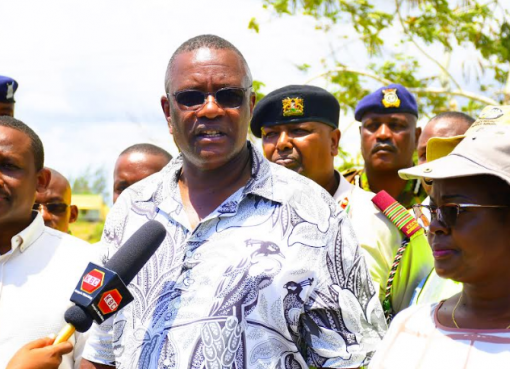Researchers, academics, students and other sector experts are expected to share at the 14th International Biennial Conference how new technological innovations can be used to tackle climate change.
Egerton University will host the conference themed, ‘Research and Innovation in a Changing Environment’ from March 23 to March 25, according to Vice Chancellor Professor Isaac Kibwage to deliberate on how private and public sector investments can help preserve crucial carbon sinks.
Prof. Kibwage indicated that participants at the event that will be held virtually via Zoom will explore ways in which the private sector can reinvent itself and come up with innovative solutions that will not only move their businesses to the next level, but also help them tap into the opportunities that lie waiting within climate adaptation as well as mitigation.
“New and tested technologies are critical in cutting down greenhouse gas emissions and enabling mankind to adapt to the now clear changes in the climate. Whereas it may seem to be costly, sustained investment in climate-smart innovations has an overall low cost and will be needed to meet global climate goals,” stated the Vice Chancellor.
During the conference keynote address will be delivered by Chief Executive Officer of Kenya National Innovation Agency (KENIA) Dr. Tonny Omwansa, Professor Lize Kriel from the University of Pretoria, Vice Chancellor and Chief Executive Officer of Kenya College of Accountancy University Prof. Isaiah Wakindiki, Chairman, Department of Chemistry, Egerton University Prof. Josphat Matasyoh and Engineer Jane Muriu from Nakuru Water and Sanitation Services Company (NAWASSCO).
Prof. Kibwage noted that according to the United Nations, fostering the use of climate innovation and technology can help implement countries’ national climate action plans as stipulated under the Paris Agreement.
Adopted by 190 countries in the French capital on December 12, 2015, before coming into force on November 4, 2016 the Paris Agreement tasks its signatories to “pursue efforts” to limit global temperature rises to 1.5 degrees centigrade. Further each country is expected to set its own emission-reduction targets, reviewed every five years to raise ambitions.
The event is jointly organized by National Research Fund Kenya (NRF), Center for Transforming African Agricultural Universities to Meaningfully Contribute to Africa’s Growth and Development (TAGDev), The Centre of Excellence in Sustainable Agriculture and Agribusiness Management (CESAAM), Center of Excellence for Livestock Innovation and Business (ELIB) and Corteva Agriscience.
Prof. Kibwage added, “Corporate leaders may leverage on technology and innovation in different fields such as agriculture and energy to reduce gasses like methane which accounts for about one-third of global warming,”
The conference will further, among other issues, discuss transformative agri-food systems, health systems, science and technology, and transformative education for socio-economic adaptability.
It will also tackle resilience and rapture in governance and geopolitics in Africa, literature, history and culture and entrepreneurship business and trade.
Like many countries in sub-Saharan Africa, Kenya has been experiencing extreme weather, including floods, lake backflows and drought.
“Climate is what makes us survive and any threat to it means a threat to our very existence. The three broad areas of focus at the conference will be increasing investments in renewable sources of energy, Green Manufacturing and curtailing deforestation,” said Prof. Kibwage.
He described ‘Green Manufacturing’ as an industrial procedure where employees utilize fewer natural resources, produce less pollution and waste, recycle and reuse materials, and moderate emissions in their processes.
“Green manufacturers do research, develop, or implement technology and procedures that reduce their environmental effect. Africa has the greatest potential to succeed in green manufacturing since the continent is yet to build Green House Gas-emitting industries,” the Vice Chancellor explained.
Acting Deputy Vice-Chancellor in charge of Division of Research and Extension Prof. Bockline Omedo Bebe indicated that the participants will further discuss how Kenya and the continent at large can prosper from the climate emergency, for instance by attracting investments in electrification of road transport as vehicle import sources shift to electric cars and increased funding to renewable energy projects to make the most of the abundance of hydro, geothermal, solar and wind energy in many parts of the country.
Prof. Bebe regretted that human activities such as felling of trees and industrialization had contributed to global warming.
“Greenhouse gases have acted as a coat, like a glass that is trapping the sun’s heat and stopping it from leaking back into space, and as a result, we are experiencing global warming,” he said.
An article by McKinsey & Company details how the global climate agenda creates opportunities for Africa to build resilience, catalyze sustainable growth, and contribute to the net-zero transition. It estimates that, in the next 30 years, more than 900 million Africans could be exposed to one or more climate threats as the planet warms.
Research from McKinsey shows that five industries namely agriculture, oil and gas, coal mining, solid-waste management, and wastewater management could reduce global annual methane emissions by 20 per cent by 2030 and 46 per cent by 2050.
On transformative agri-food systems, Professor Bebe stated there was a need for systemic approach and collective action by producers, distributors and consumers, together with both levels of government, private sector, academia and civil society.
He explained that the “agri-food system” covers the journey of food from when it is planted, grown, harvested, processed, packaged, transported, distributed, traded, bought, prepared, eaten and disposed of.
Prof. Bebe observed that food and nutrition security remains Africa’s most fundamental challenge, adding that the number of people in the continent who are undernourished has been on the steady rise for decades and now stands at over 200 million.
“COVID-19 pandemic laid bare the fragility of our food systems, which had already been negatively affected by the effects of climate change including droughts, floods and locust invasions. In the coming decades, the world food structure will face huge challenges to feed the population. This is being driven by on-going growth of the world population, the limited availability of natural resources and climate change.
He stated that transforming Africa’s agri-food systems rests with four cross-cutting/cross-sectional accelerators – technology, innovation, data and “complements” (governance, human capital, and institutions).
While noting that 144 million children globally under the age of 5 suffer from stunting and a further 47 million from wasting, Prof. Bebe indicated that agri-food system transformation was urgently needed to end hunger and malnutrition and feed everyone in Africa with safe and nutritious food.
“More people are now suffering from food insecurity since the Covid-19 pandemic began and the trends are not encouraging. The goal of feeding the world’s 10 billion people by 2050 would require efficient and sustainable agri-food systems that are able to produce safe and nutritious food for everyone. We must create the economic growth and employment opportunities needed to eradicate poverty, reduce inequality, sustain biodiversity and preserve the natural resource environment,” he stressed.
He said panelists will present latest technologies and innovations critical not only for ensuring nutritious food at all times but also for mitigating climate change, harnessing agriculture and the broader food system as a driver of economic and sustainable development.
“Achieving zero hunger by 2030 will require new and existing applications of science, technology, and innovation across the food system. The event will highlight tools and techniques on improving productivity and minimizing post-harvest loss” said Prof. Bebe
Prof. Bebe added “Food security is more than just a full stomach. Food security exists when all people, at all times, have access to sufficient, safe, and nutritious food that meets their food preferences and dietary needs for an active and healthy life.”
Prof. Bebe called for action to minimize the trade-offs between competing policy objectives to harness innovation and digital technologies to pursue a 4-R approach to Reduce, Reuse, Recycle and Recover in relation to water, land and agricultural inputs and to strengthen governance, human capital and institutions.
“Every stakeholder within the agri-food system will need to transform operations and retool approaches with the aim of providing safe and nutritious amounts of foods that are efficiently and sustainably produced. There is a greater need for the public sector to partner with the private sector to find solutions to promote digital solutions and innovation. We need to build the capacities in countries but also strengthen our ability for collective action to develop the agri-food systems we want,” he emphasized.
By Anne Mwale




